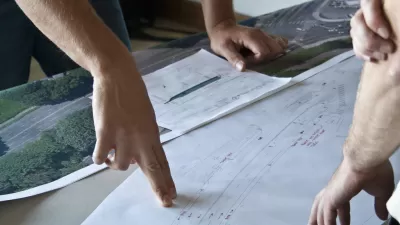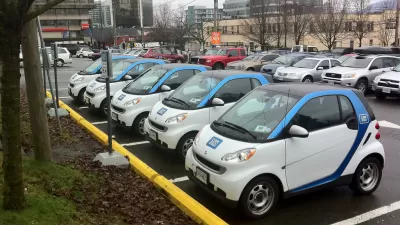Most members of the public are still very skeptical that removing a vehicle lane won’t cause terrible congestion—especially on already busy streets. A recent articles details some of the counter arguments to those concerns.

In anticipation of Calgrary’s proposal to build a network of cycle tracks in its downtown, Tom Babin explores claims that removing travel lanes won’t wreak traffic havoc on the city.
The most controversial of the proposed plans: to turn a lane of traffic on 1 Street S.E./Macleod Trail downtown into a cycle track—one of four lanes on the road would be given to bikers.
“Doubts about the idea turned to outright skepticism when a traffic study was presented as part of the proposal that said the cycle track would lead to an increase in travel time on 1st Street by a mere 30 to 60 seconds during the evening commute,” writes Babin.
Skeptical, Babin consulted with Rock Miller, the Irvine, CA-based transportation planner and traffic engineer who prepared the report. Miller explains concepts like extra capacity and turning lights. Miller even suggests that travel times might even improve on the street.
Still skeptical, Babin questions Sandeep Agrawal, a professor and director of the Planning Program at the University of Alberta in Edmonton, who lays out a very strong argument: “Whenever you remove a travel lane and put in a bike lane, the bike lane gets a bad rap…The question is, if those people (on bikes) were in cars, how much would it have delayed traffic? They probably would have delayed it more.”
FULL STORY: Remove a lane to improve traffic? Expert explains his Calgary’s cycle track proposal

Planetizen Federal Action Tracker
A weekly monitor of how Trump’s orders and actions are impacting planners and planning in America.

Congressman Proposes Bill to Rename DC Metro “Trump Train”
The Make Autorail Great Again Act would withhold federal funding to the system until the Washington Metropolitan Area Transit Authority (WMATA), rebrands as the Washington Metropolitan Authority for Greater Access (WMAGA).

The Simple Legislative Tool Transforming Vacant Downtowns
In California, Michigan and Georgia, an easy win is bringing dollars — and delight — back to city centers.

The States Losing Rural Delivery Rooms at an Alarming Pace
In some states, as few as 9% of rural hospitals still deliver babies. As a result, rising pre-term births, no adequate pre-term care and "harrowing" close calls are a growing reality.

The Small South Asian Republic Going all in on EVs
Thanks to one simple policy change less than five years ago, 65% of new cars in this Himalayan country are now electric.

DC Backpedals on Bike Lane Protection, Swaps Barriers for Paint
Citing aesthetic concerns, the city is removing the concrete barriers and flexposts that once separated Arizona Avenue cyclists from motor vehicles.
Urban Design for Planners 1: Software Tools
This six-course series explores essential urban design concepts using open source software and equips planners with the tools they need to participate fully in the urban design process.
Planning for Universal Design
Learn the tools for implementing Universal Design in planning regulations.
Smith Gee Studio
City of Charlotte
City of Camden Redevelopment Agency
City of Astoria
Transportation Research & Education Center (TREC) at Portland State University
US High Speed Rail Association
City of Camden Redevelopment Agency
Municipality of Princeton (NJ)




























